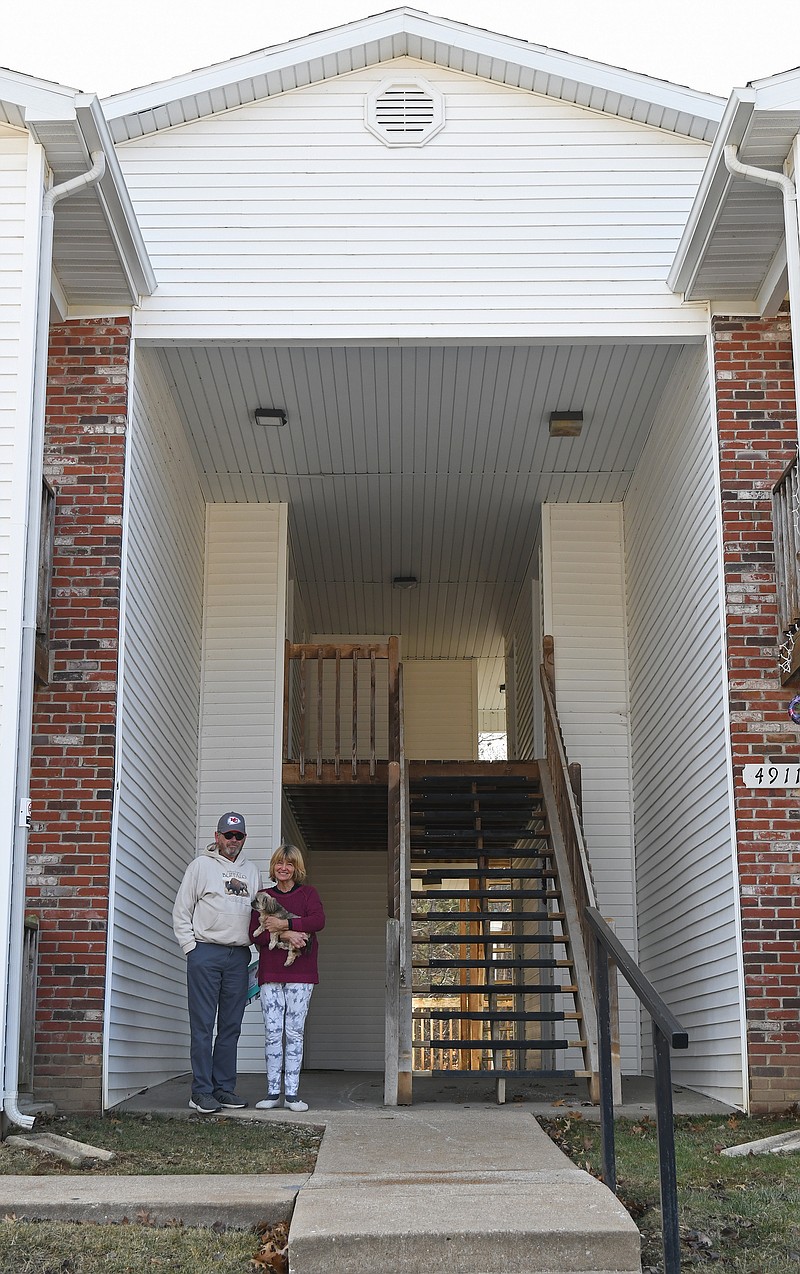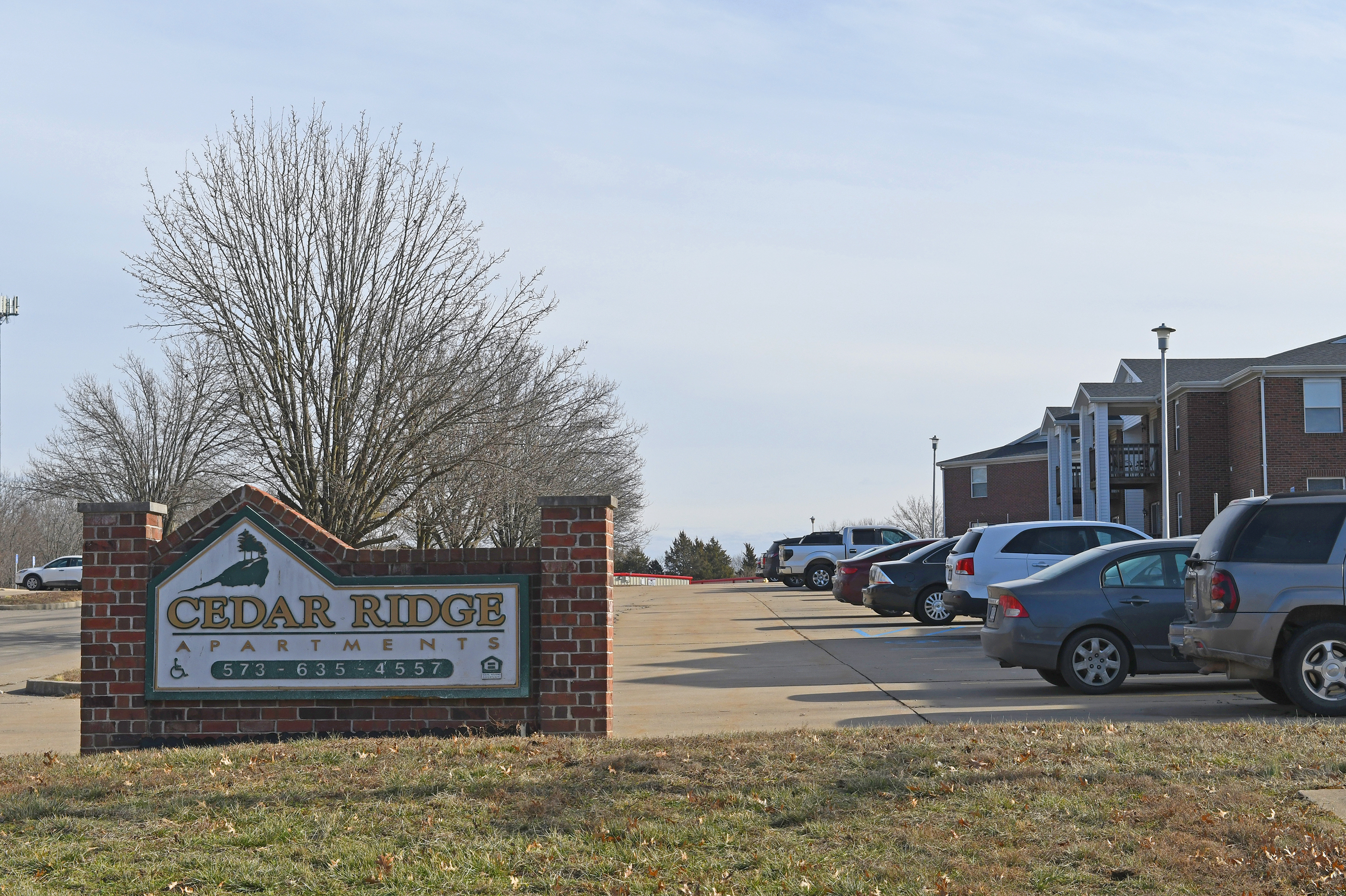A review of letters sent in opposition and support of four workforce housing projects proposed for Jefferson City may not explain why the Missouri Housing Development Commission refused to offer tax credits for any of the projects, but it does bring into sharp focus the divide within the community over the projects.
The commission received 372 pages of materials, which included letters, photographs, copies of old newspaper articles, a list of people in opposition to the projects and a resumé from a former mayor of Jefferson City.
Among 115 multi-family housing projects the commission was considering for federal Low Income Housing Tax Credits were four developments proposed for Jefferson City -- Eastland Hills Apartments in the 1800 block of East Miller Street; Oak Leaf Villas at Oak Leaf Drive; Stronghold Landing at Trade Center Parkway; and Simonsen Place in the 500 block of East Miller Street.
The commission rejected all four projects Dec. 10, despite two of them being among the highest-rated projects in the competition for tax credits.
Organizers of the local projects said they were crushed by the news. But some had sinking feelings about their chances when they learned opposition intended to conduct a letter-writing campaign to let the commission know how they felt. Although supporters understood that commission staff members would reject projects with even a little bit of opposition, they, too, conducted a letter-writing campaign.
Volume of letters
The commission received hundreds of letters, photos and newspaper clippings. Someone even sent in a recycled 2015 letter from a state representative who left because of term limits more than four years ago.
About 50 Jefferson City residents sent letters in opposition to each of the projects. There was only one letter in opposition to Simonsen Place. Several people, such as former Mayor Tom Rackers, sent multiple letters expressing opposition to each project. The opposition also collected a list of names of more than 100 people who sided with them about the projects -- and presented that to commission staff.
About an equal number of individuals, businesses, and governments provided letters of support for each of the projects. Simonsen Place received five letters of support.
Key opposition issues
A common complaint from opposition to the projects was that letter-writers felt gobsmacked in September when three of the projects appeared on a Jefferson City Council meeting agenda.
Letters like that from Clayton Hill, a Jefferson City resident who frequently sends letters to the editor to the News Tribune, said nearby residents were concerned that the projects were being pushed through without ever having had public input. They worried the developments were being done without City Council approval.
Some community members didn't understand the projects were being done privately and didn't require the council's approval because they would not need rezoning exceptions. In September, each project went in front of the council to seek a resolution expressing the city's support of the private development to present to the commission.
Other letters decried Jefferson City's involvement in "government housing." Some seemed confused that Missouri is administering a federal program. The MHDC administers Low Income Housing Tax Credits, which go to investors in affordable housing through an annual competitive application process. Once approved, according to mhdc.com, the credit can by used each year for 10 years and is allocated to developers, who then sell it to raise equity to construct or acquire and rehabilitate affordable rental housing. Government does not give the applicants money, it simply gives them tax credits.
Stan Horn wrote in opposition to the Eastland Hills development.
"I write today to oppose the not-so-well publicized move to apply for a housing project through the Low Income Housing Tax Credit program of the Missouri Housing Development Commission," Horn wrote. "As with other similar projects, my concern is the lack of control of what these 'government housing projects' might and have become."
Private versus public
Horn compared the developments with other apartment buildings in Jefferson City, such as Dulle and Hamilton towers. However, the towers differ greatly from the proposed workforce housing projects, according to Bo West, developer at Eastland Hills.
The developments at Dulle and Hamilton towers are public housing -- created by government and managed by the Jefferson City Housing Authority. They are intended for individuals over the age of 50, and for individuals of any age with a disability, according to the housing authority website. They are also generally much smaller than the units inside the four proposed Jefferson City projects. "Rent is based on 30 percent of the tenant's income and includes utilities," it states.
"I do not believe taxpayer money should be used to create a burden on other public entities," 4th Ward Councilman Derrick Spicer wrote in his letter to the MHDC. "This would be problematic to our school district as they have opposed this project."
Several opponents to the proposed developments are under the impression that government money is to pay for the projects. That is not the case. Three of the projects have qualified for disaster funding stemming from the 2019 Jefferson City tornado. But the MHDC was only to consider requests for tax credits.
"The developments we are pursuing are private," West said. "The funding mechanism is tax credits, which we are applying for. They are no different than tax credits from anything else, such as child tax credits."
If awarded, the developers can sell the credits to firms who can apply them to businesses for their clients. Developers are able to fund development of affordable housing this way, West said.
The developers of the Jefferson City projects wish to offer mixed-use properties, with some affordable housing and some that is at market rates, West continued.
"When you do that, you're interacting with different income levels," West said. "It can help poor people take the next step up the ladder."
West, with others, developed Cedar Ridge, a project that used LIHTC financing, in the late '90s. The apartment complex remains well-maintained and continues to offer affordable apartments.
"It's a shame that 50 people in a town of 40,000 can sway that vote," West said.
Supporters of the developments said, with the MHDC behind them, the developments would be assets for the community for years to come. They said Jefferson City's housing shortage is severe, and that it is crippling community and economic growth.
Ann Bax, president of the United Way of Central Missouri, and Andy Fechtel, who is the local United Way board chairman and is sales manager at Fechtel Beverage and Sales, sent a joint letter to the commission in support of the proposed developments.
More than 20 major Jefferson City employers are members of the local United Way board, the letter states.
"We are aware of the negative impact a lack of quality affordable housing has on a community and its members, and see the ripple effect on the clients we serve every day," the letter stated. "Salvation Army, our trusted partner, currently has eight people living in the Center of Hope homeless shelter who have the financial capacity to be self-sufficient and in permanent housing, but there are no affordable rental units available."
Luke Holtschneider, president and CEO of the Jefferson City Regional Economic Partnership, said in a letter of support for the projects (specifically Eastland Hills) that the projects would help alleviate some workforce challenges.
"I plead with you to assist us in addressing our biggest barrier to economic sustainability and growth, which is affordable housing," he wrote. "While communities surrounding Jefferson City have grown in population and wealth, we have struggled to break even over the past two decades.
"We are the seat of state government and home to a diverse industry base, but we must continue to grow our community in a way that supports these operations. JC is challenged with workforce availability, and that availability is hindered by the lack of affordable housing. Employers are currently unable to meet the workforce needs for their current operations, which is forcing them to make investments outside the area and many times outside of Missouri."
Jefferson City's businesses have opportunities for large growth, he added, but it will not happen if there is not anymore affordable housing in the community.
More opposition concerns
Several letter-writers suggested building the apartments would lead to drug and crime problems.
Debbie Chick said her parents had lived in the family home since 1959, when they had it built, and it has always been her family home. She said she and her neighbors were devastated to hear about the developer wishing to put duplexes in.
"This housing project will cause more noise, traffic, trespassing and crime in this established quiet neighborhood," Chick wrote. "Not to mention the lowering of our property value."
The writer agreed the city needs more housing, just not in that neighborhood.
"I just wonder, if all of the people that want this to go through would like this housing project in the back yard and at their property line," she said.
Many opponents to the Eastland Hills development pointed out it is on a dead end street, which could be a safety challenge -- emergency vehicles would struggle to get in and out -- and that it could lead to crime.
"The location of this project lies at the dead end of East Elm Street with only one way in/out to all residents that occupy this complex," Jerome G. Rehagen said. "This seems problematic for emergency response issues as well as the potential for nefarious activity."
In another letter, Rehagen expressed concern for the stress on the local school because it "already struggles to accommodate families with clusters of poverty."
"This proposal has had no public notice to the citizens which would enable the opportunity to voice their concerns about the home values amongst a large existence of hard-working and law-abiding families in this east part of Jefferson City," he wrote.
"Today, we do not have any theft problems in our neighborhood," Roger Schwartze wrote. "I am concerned that will not be the case if these apartments are built."
Supporters see benefits
Ricky Kutscher wrote to the MHDC concerning Eastland Hills. He pointed out he grew up in another apartment complex Bo West's family is involved with -- Colonial West. It should be noted Colonial West is a market rate apartment, and that the LIHTC would allow the new apartments to be built at low enough costs a percentage could be rented at reduced rates.
For example, Stronghold Landing would offer 40 units. Seventy-five percent would be available to tenants at or below 30 to 60 percent of area median income, and 25 percent would be available to tenants above 60 percent, but below 80 percent of area median income.
It would have offered 28 two-bedroom units at rates of $460-$650 per month, and 12 three-bedroom units at $530-$735 per month.
Other projects were to include full-market-rate units within their developments.
Kutscher said he grew up in Colonial West, and lived there with his mother and two sisters.
"We always felt safe, in a well-maintained and secure property that was taken care of at a superb level," he wrote.
Others wrote in to demonstrate the dire need for rental properties that exists in Jefferson City.
Ralph G. Biele wanted to let MHDC members know what his experience in Jefferson City is. He said he sold a home in Jefferson City with the expectation that he would move into an apartment.
"I recently sold my home and was unable to find an apartment to rent," Biele wrote. "At one facility, there was a waiting list of 20, and I was told it would likely be a year before a vacancy would be available."
Tim Schneiders said he and his wife own several duplexes and single-family homes in the city, which they rent out.
"My wife and I receive frequent inquiries on available housing that we manage. Unfortunately, we have to turn these people away because our units are full. When we do have a vacancy, we receive 30-40 inquiries to view the property."
The housing crisis is also a workforce crisis in Jefferson City, business leaders wrote to the commission.
Amy Sublett, executive director of the Central Workforce Development Board, said the availability (or lack) of housing has a significant economic impact on a community's ability to attract and maintain a quality workforce.
"Currently, job openings in the Central Missouri area outnumber job seekers almost two to one. Area businesses are struggling to be competitive because of lack of workers," Sublett wrote. "Ensuring a community's economic well-being requires all of these factors to be interconnected. This is an important and excellent opportunity for our community."
The Hitachi Energy plant has been a staple of the Jefferson City community since it first started manufacturing electrical transformers in 1972, facility manager Greg Callahan wrote.
"Jefferson City continues operation, staffed with about 950 essential workers that provide critical infrastructure for utility companies that keep the nation's electrical grid up and running," Callahan wrote.
He added the production and modernization of transformers factor in the efficacy and security of the national grid. The overall U.S. transformer industry and the nation's power grids depend on manufacturers such as Hitachi.
On May 22, 2022, exactly three years after a tornado destroyed a large percentage of Jefferson City's low-income housing, Hitachi celebrated Jefferson City's 50th anniversary with Gov. Mike Parson, Callahan said.
And during that celebration, Hitachi leadership "... conveyed the need for housing development within the state of Missouri -- more specifically, Jefferson City," he said. "With recruiting challenges across the United States, and the need to recruit employees/new families to our community to support the high demand and anticipated growth in our workforce, we are excited to see proposals for workforce housing developments projects in Jefferson City. The need is urgent and the time is right."
See also:
People who sent letters of opposition to developments
People who sent letters of support for developments
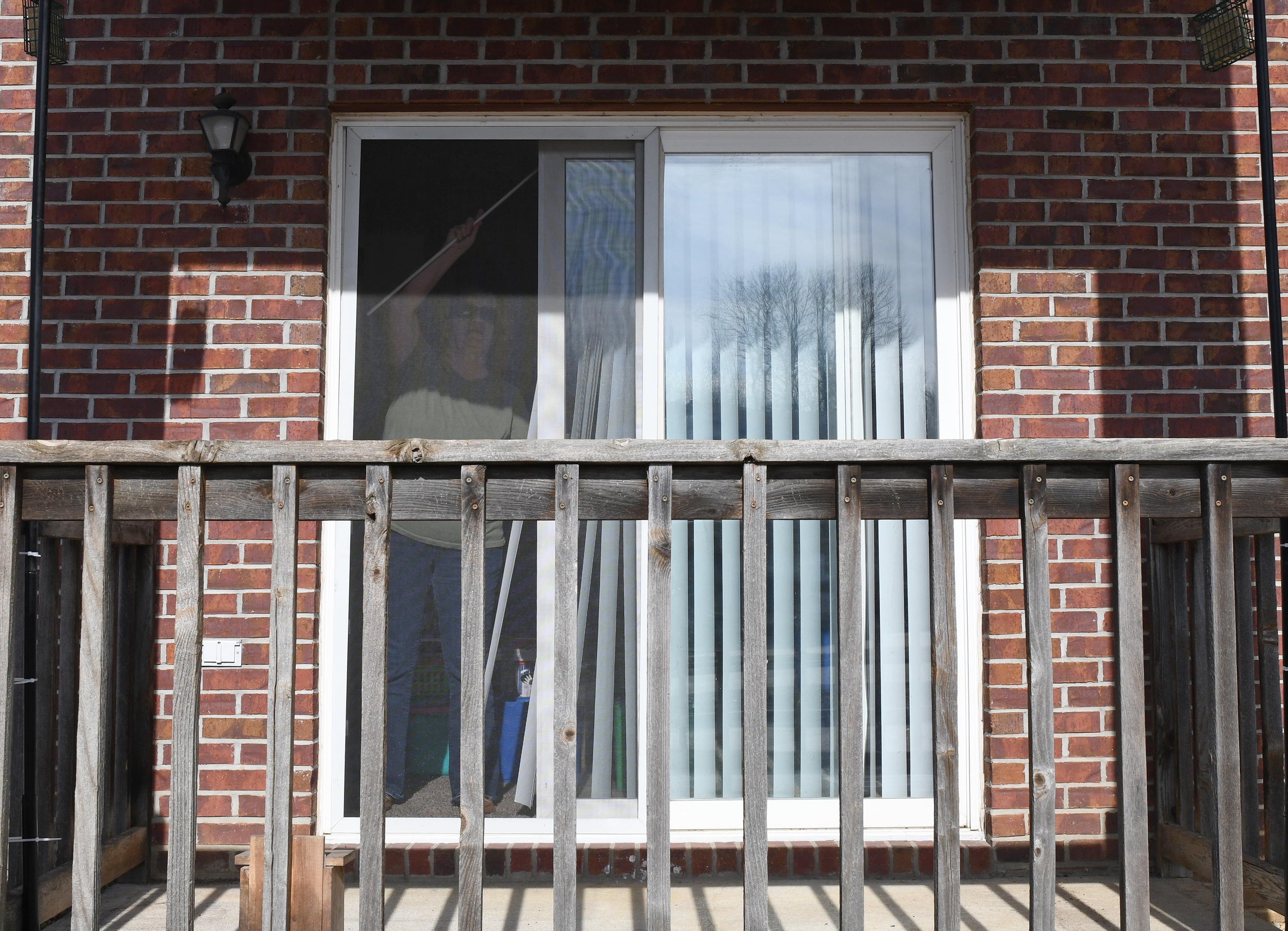 Eileen Wisniowicz/News Tribune photo: Priscilla York opens the blinds on her apartment at Cedar Ridge Apartments on Friday, Dec. 30, 2022. York has lived at Cedar Ridge for about three years after moving from Maine to help raise her grandchildren. York comments on the low rent and walking distance to neccessities of Cedar Ridge Apartments.
Eileen Wisniowicz/News Tribune photo: Priscilla York opens the blinds on her apartment at Cedar Ridge Apartments on Friday, Dec. 30, 2022. York has lived at Cedar Ridge for about three years after moving from Maine to help raise her grandchildren. York comments on the low rent and walking distance to neccessities of Cedar Ridge Apartments.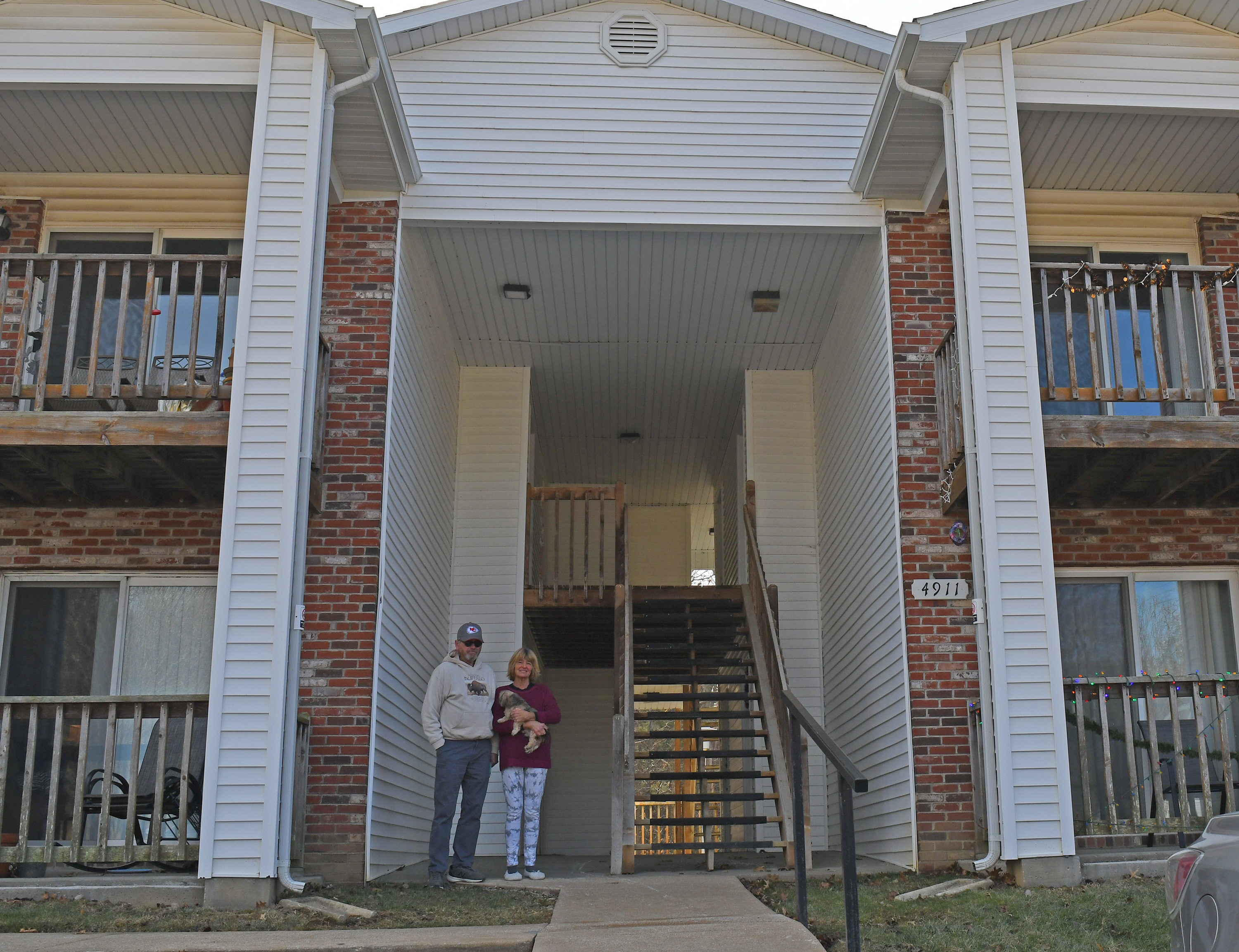 Eileen Wisniowicz/News Tribune photo: Arthur and Margaret Peters pose for a photo while holding their dog Oakley on Friday, Dec. 30, 2022 in front of their apartment at Cedar Ridge Apartments. The Peters have lived in the apartment complex since July and said they've enjoyed it. "Good neighbors, good management," commented Margaret.
Eileen Wisniowicz/News Tribune photo: Arthur and Margaret Peters pose for a photo while holding their dog Oakley on Friday, Dec. 30, 2022 in front of their apartment at Cedar Ridge Apartments. The Peters have lived in the apartment complex since July and said they've enjoyed it. "Good neighbors, good management," commented Margaret.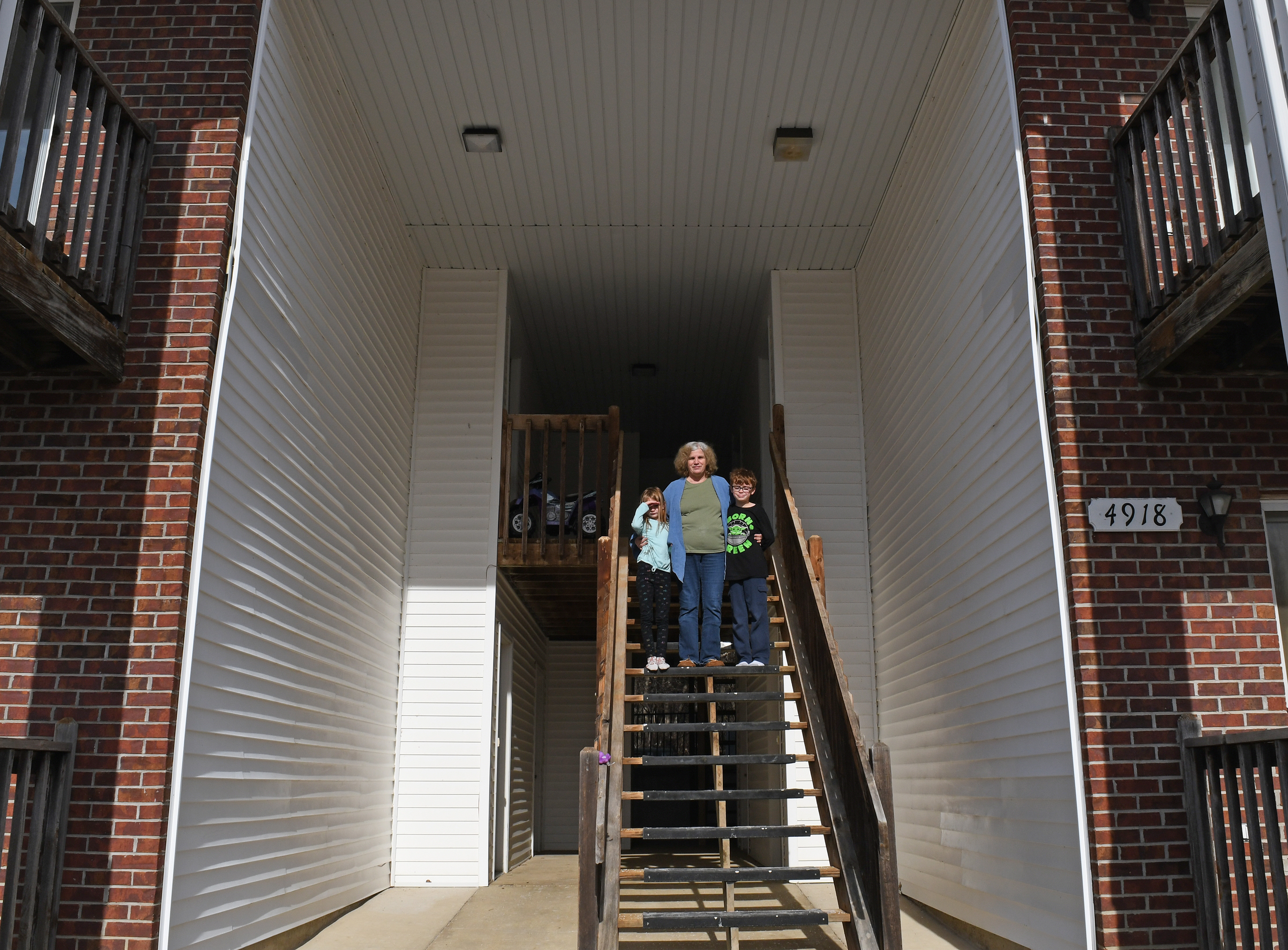 Eileen Wisniowicz/News Tribune photo: Priscilla York, middle, poses with her grandchildren Emma Rose Hawkins, left, and Aiden Hawkins, right, on Friday, Dec. 30, 2022 in front of her apartment at Cedar Ridge Apartments. York moved to Jefferson City from Maine three years ago to help raise her grandchildren. York says her move wouldn't have been possible without the low rent Cedar Ridge Apartments offered.
Eileen Wisniowicz/News Tribune photo: Priscilla York, middle, poses with her grandchildren Emma Rose Hawkins, left, and Aiden Hawkins, right, on Friday, Dec. 30, 2022 in front of her apartment at Cedar Ridge Apartments. York moved to Jefferson City from Maine three years ago to help raise her grandchildren. York says her move wouldn't have been possible without the low rent Cedar Ridge Apartments offered.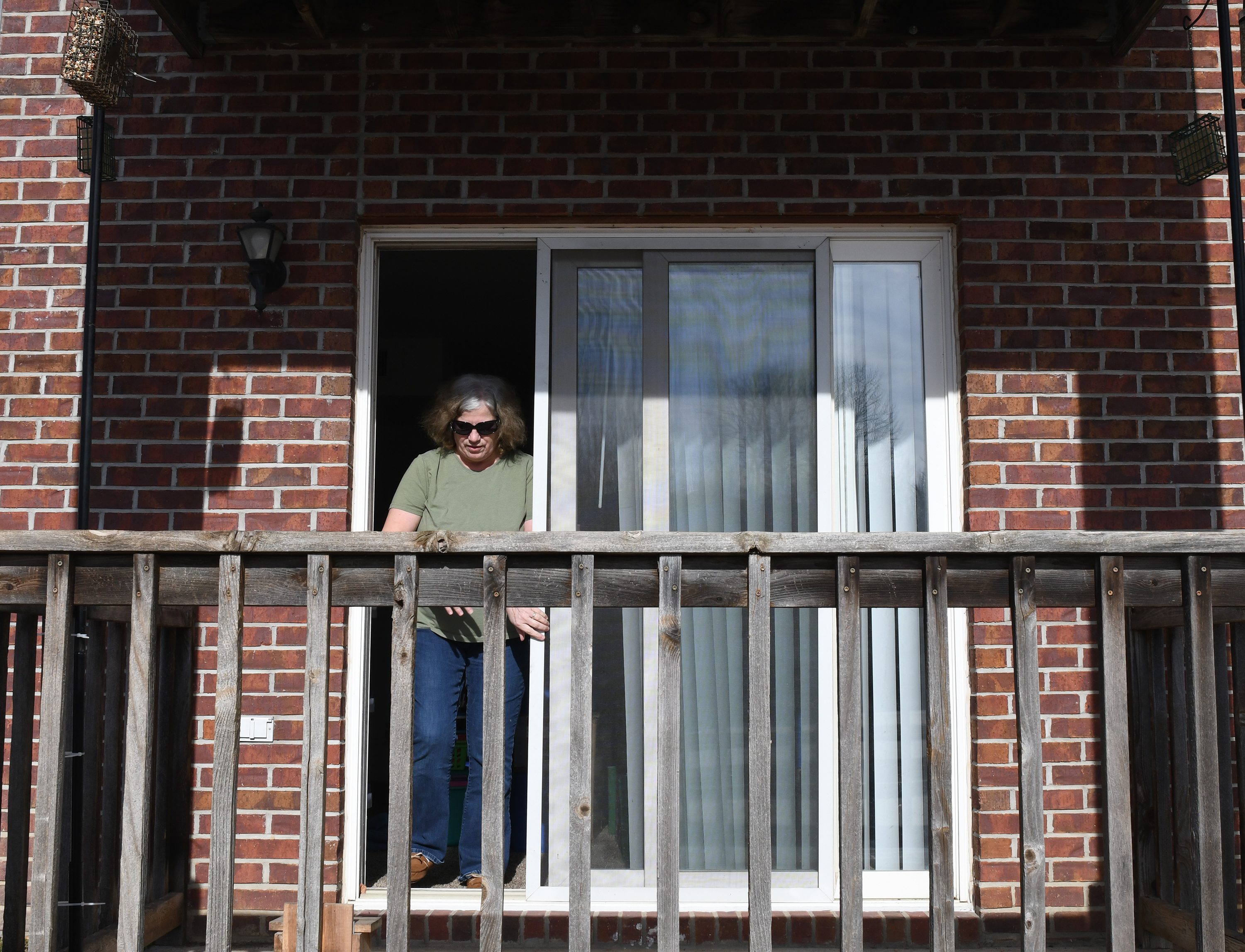 Eileen Wisniowicz/News Tribune photo: Priscilla York opens the blinds on her apartment at Cedar Ridge Apartments on Friday, Dec. 30, 2022. York has lived at Cedar Ridge for about three years after moving from Maine to help raise her grandchildren. York comments on the low rent and walking distance to neccessities of Cedar Ridge Apartments.
Eileen Wisniowicz/News Tribune photo: Priscilla York opens the blinds on her apartment at Cedar Ridge Apartments on Friday, Dec. 30, 2022. York has lived at Cedar Ridge for about three years after moving from Maine to help raise her grandchildren. York comments on the low rent and walking distance to neccessities of Cedar Ridge Apartments.

